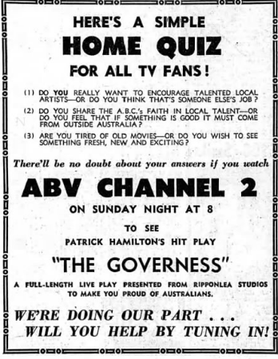Related Research Articles

Triple J is a government-funded, national Australian radio station that began broadcasting in 1975 as a division of the Australian Broadcasting Corporation (ABC). It aims to appeal to young listeners of alternative music, and plays more Australian content than commercial networks.

The Special Broadcasting Service (SBS) is an Australian hybrid-funded public service broadcaster. About 80 percent of funding for the company is derived from the Australian Government. SBS operates six TV channels and seven radio networks.

Redmond Symons is an Australian musician and television and radio personality. He was the lead guitarist in the band Skyhooks, the snide judge of 'Red Faces' and a judge on talent search show Australia's Got Talent. He hosted ABC Radio Melbourne's breakfast show from 2003 until 2017.

Richard John Sinclair Laws CBE is an Australian radio announcer. For 50 years, until 2007, he was the host of an Australian morning radio program combining music with interviews, opinion, live advertising readings and listener talkback. His distinctive voice earned him the nickname "the Golden Tonsils". Although officially retired between 2007 and 2011, he returned in February 2011 to host a morning program on 2SM and the Super Radio Network.
John Andrew Durrant Olle was an Australian radio and television presenter who mostly worked for the Australian Broadcasting Corporation.
Michael Brady is an English-born Australian musician, most commonly associated with the Australian rules football anthems "Up There Cazaly", referring to 1910s St Kilda and 1920s South Melbourne player Roy Cazaly, and "One Day in September", which were released by The Two-Man Band. Both songs have become synonymous with Australian rules football and are traditionally sung on AFL Grand Final day in September.

ABC News, also known as ABC News and Current Affairs and overseas as ABC Australia, is a public news service produced by the Australian Broadcasting Corporation. Broadcasting within Australia and the rest of the world, the service covers both local and world affairs.

Astor - Radio Corporation - Electronic Industries was the largest Australian electronics manufacturer, manufacturing across the retail sector of products from Washing Machines to Radio. Astor, which began operating in 1926, making electronics in Victoria was founded by Arthur Warner. The firm was innovative in that it offered radios in dynamic designs and colours compared with the conservative designs offered by other companies.
Bob Rogers OAM is an Australian disc jockey and radio broadcaster. He is noted for introducing Top 40 radio programming to Australia in 1958, on 2UE.
Captain Carvallo is a traditional comedy play in three acts by Denis Cannan, telling the story of a philandering young army officer, Captain Carvallo.
Wilfrid Coad Thomas AO was a British-born singer and broadcaster, who had a significant career in Australia, later in London as radio and television commentator for the BBC. His name is very frequently mis-spelled "Wilfred".
Hal Lashwood's Alabama Jubilee was an Australian television variety series hosted by Hal Lashwood which aired from 1958 to 1961 on ABC Television. It was essentially a minstrel show, with some of the performers appearing in blackface makeup. In 1960, it was retitled Hal Lashwood's Minstrels.
The Astor Show was an Australian television series which aired in 1958 on Melbourne station GTV-9. In the series, the cast danced to and mimed hit recordings. The series ended with the 31 August 1958 broadcast. The timeslot of the series was then occupied for several weeks by a series of specials starring Shirley Abicair, and later by an American drama series.
In Melbourne Today was an early Australian television series, which aired in two versions in the 1950s, on Melbourne station GTV-9. It was Australia's first breakfast television series.
Treason is a 1959 Australian television live drama, which aired on ABC about the 20 July plot during World War Two. Originally broadcast 16 December 1959 in Melbourne, a kinescope ("telerecording") was made of the program and shown in Sydney on 13 January 1960. It was an adaptation of a stage play by Welsh writer Saunders Lewis, which had previously been adapted as an episode of BBC Sunday-Night Theatre.
Dark Brown is an early Australian television film, broadcast during 1957 on ABC.

Antony and Cleopatra is a 1959 Australian television play based on the play by William Shakespeare.
Small Victory is a 1958 television play broadcast by the Australian Broadcasting Corporation. It was set during the Korean War. It was directed by William Sterling and was shot in Melbourne where it aired 26 March 1958.

The Governess is a 1958 television play broadcast by the Australian Broadcasting Corporation based on a play by Patrick Hamilton, which had been performed several times on Australian radio. It was directed by William Sterling who had previously directed an adaptation of Hamilton's Gaslight (1958).
References
- ↑ "Man Behind The Scenes". The Sydney Morning Herald . 19 May 1958. p. 15. Retrieved 18 June 2013.
- ↑ "TV Program of War Songs". The Sydney Morning Herald . 26 April 1958. p. 4. Retrieved 18 June 2013.
- ↑ "Melbourne Show". The Sydney Morning Herald . 15 September 1958. p. 9. Retrieved 18 June 2013.
- ↑ "Mr. Eccleston Is On Again". The Sydney Morning Herald . 27 December 1958. p. 3. Retrieved 18 June 2013.